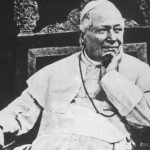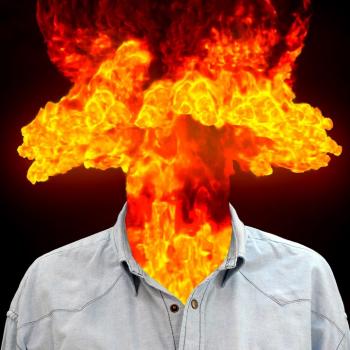
Image via Pixabay
But Alt! The very same text you cite (Donum Veritatis) to claim that Catholics must submit to the Magisterium on all points also says that some teachings may have ‘deficiences.’ The CDF says some things might be reformable. Do you really mean to say Catholics must not object to such things?”
Yes. This is not the green light for dissent some claim it to be. Let’s take a look at the actual extent of these words in Donum Veritatis. The discussion begins at §24.
Finally, in order to serve the People of God as well as possible, in particular, by warning them of dangerous opinions which could lead to error, the Magisterium can intervene in questions under discussion which involve, in addition to solid principles, certain contingent and conjectural elements. It often only becomes possible with the passage of time to distinguish between what is necessary and what is contingent.
Now an immediate example that should occur to you at this point, dear reader, is Laudato Si. Clearly there are passages in the text with deal with the “solid principle” of man’s duty to protect the Earth. Just as clearly there are passages that deal with the pope’s “contingent and conjectural” belief in climate change. (Benedict XVI shared that belief, by the way.) Pope Francis himself makes note of this:
There are certain environmental issues where it is not easy to achieve a broad consensus. Here I would state once more that the Church does not presume to settle scientific questions or to replace politics. But I am concerned to encourage an honest and open debate so that particular interests or ideologies will not prejudice the common good.
The pope has enough humility to concede that he is not able to answer all questions definitively. But he takes up the discussion for the sake of “the common good.” He takes it up so he may remind the Church of “solid principles” that remain, whatever the truth of the scientific question.
A second example would be the Holy Office’s condemnation of Galileo’s theories in 1616. (Today the Holy Office is the CDF.) Cardinal Bellarmine said that, though Galileo was forbidden to hold or defend heolicentrism, he was not forbidden to conjecture. Conjecture all you like, just don’t claim you know this to be so. Likewise in 1623, Pope Urban VIII (to whom he had appealed) warned Galileo that he could only present the arguments for and against heliocentrism; he could not advocate it.
One must remember that, at the time, geocentrism was the accepted view of scientists. The Church was interested in defending a “solid principle”—the right understanding of Scripture. (This was a huge issue during the Reformation, you will recall.) In the Galileo case, this depended upon a question of conjecture, namely, heliocentrism. If the sun was stationary and the planets in motion, certain texts of the Bible might be in doubt (e.g., Josh. 10:13 and Eccl. 1:5). So the Church was cautious and nuanced in its approach to Galileo. Only with time was the Church able to understand better how to reconcile the truth of heliocentrism with the Biblical texts. The stricture against promoting heliocentrism no longer applied.
***
But before we rush to the conclusion that we can openly dispute things we think to be false or “conjectural,” we should look at how the CDF develops its observation.
The willingness to submit loyally to the teaching of the Magisterium on matters per se not irreformable must be the rule.
Now see that? The CDF says, “Some things might be conjecture; it says, “Some things might be contingent rather than necessary.” But then it straightway adds: “Loyal submission is still the rule.” Don’t get excited and start itching for the rebellion.
There’s more.
It can happen, however, that a theologian may, according to the case, raise questions regarding the timeliness, the form, or even the contents of magisterial interventions.
This is a privilege the Church grants to theologians. Theologians have training the ordinary laity do not. Theologians better understand all the issues at stake.
The CDF will take up that point again a bit later. But for now the text turns to a discussion of what sort of “defects” might be present in ordinary teaching.
When it comes to the question of interventions in the prudential order, it could happen that some Magisterial documents might not be free from all deficiencies. [It “could” happen with “some” texts. They might not be free from “all” deficiencies.] Bishops and their advisors have not always taken into immediate consideration every aspect or the entire complexity of a question.
Be careful not to run wild with these words and use them as a license to say, “Pfft! I’m not listening to that crap!” Note the limits that the CDF sets up around this possibility of “deficiencies.”
- It “could” happen. Well, anything “could” happen. There could be a typo in this blog post. Mr. Trump could convert to Christ. The quick brown fox could jump over the lazy dog.
- A text might not be free from “all” deficiencies. No, not all of them. But how many might creep in? Five percent? Two percent? .00000000000009%?
- The deficiencies, if there, would be a result of bishops failing to consider “every aspect or the entire complexity of a question.” That is, the “deficiencies” are more the result of a teaching’s being incomplete or for a time wrong. God does not reveal the whole truth in a big strong zap but in stages. Cardinal Newman understood this.
And note what the CDF says next:
But it would be contrary to the truth, if, proceeding from some particular cases, one were to conclude that the Church’s Magisterium can be habitually mistaken in its prudential judgments, or that it does not enjoy divine assistance in the integral exercise of its mission.
There are always “some particular cases.” So don’t get too eager or start to make excuses for rebellion; don’t quickly seize upon something you want to flout; don’t rub your chin and say, “Well, there are such a small number of infallible statements,” though you may throw all else to the four winds. No. Even “in its prudential judgments” the Magisterium has “divine assistance” and is not “habitually mistaken.”
Donum Veritatis goes on:
In fact, the theologian, who cannot pursue his discipline well without a certain competence in history, is aware of the filtering which occurs with the passage of time. This is not to be understood in the sense of a relativization of the tenets of the faith. The theologian knows that some judgments of the Magisterium could be justified at the time in which they were made, because while the pronouncements contained true assertions and others which were not sure, both types were inextricably connected. Only time has permitted discernment and, after deeper study, the attainment of true doctrinal progress.
If it is “only time” that permits this deeper discernment, some rebellious spirit in the pew certainly is not in possession of that discernment.
And here the CDF gives one more reason why some teachings of the Ordinary Magisterium may have “deficiencies.” It is not that “the tenets of the faith” are in doubt. Some judgments of the Church may be “justified at the time” because of their connection to disputed points that had not yet been settled.
Take, for example, the Holy Office’s judgment with respect to Galileo. At the time, the stability of the political order was tied up with religious belief. We tend not to appreciate that like we should. Heresy was a capital crime because of its ability to upset the State; and the Church had just been through a bad experience with private interpretation of Scripture causing the schism of whole states. If people were to think, before the question were settled, that the sun sat still and the planets circled, and the truth of certain verses were thus put in doubt, there could have been more trouble. The Church was, therefore, wise to be cautious with Galileo. In the different world of today, the Church can take a more liberal approach. We can’t take our modern sensibility and read it back into an earlier age that would have found it alien.
This is the kind of thing the CDF is thinking of when it says that some Magisterial texts may have “deficiencies.”
***
And now the CDF returns to the role of the theologian in expressing dissent; it clarifies the form such dissent ought to take.
Even if the doctrine of the faith is not in question, the theologian will not present his own opinions or divergent hypotheses as though they were non-arguable conclusions. Respect for the truth as well as for the People of God requires this discretion (cf. Rom. 14:1-15; 1 Cor. 8; 10:23-33 ). For the same reasons, the theologian will refrain from giving untimely public expression to them.
So the dissent must come from a theologian. It must be expressed with charity and “discretion,” and not as though the theologian were in possession of a “non-arguable conclusion.” And the theologian—note this—“will refrain from giving untimely public expression” of his dubia.
Did you catch that, Cardinal Burke? May I send you a copy of Donum Veritatis? I will highlight these sections in yellow for your convenience.
And the CDF is clear that, even when you are a theologian, even when you are charitable, and even when you are discreet, you have a duty “to accept the teaching of the Magisterium.” Yes, it does say that:
In any case there should never be a diminishment of that fundamental openness loyally to accept the teaching of the Magisterium as is fitting for every believer by reason of the obedience of faith. The theologian will strive then to understand this teaching in its contents, arguments, and purposes. This will mean an intense and patient reflection on his part and a readiness, if need be, to revise his own opinions and examine the objections which his colleagues might offer him.
Be more ready, in these cases, to revise your own views than to urge your own upon the Church. Even the theologian who has some lattitude to express doubt is obligated to this “obedience of faith.” Any dubia he has he should express “in an evangelical spirit and with a profound desire to resolve the difficulties.” The CDF, further, is clear about what “an evangelical spirit” is not. (Are you paying attention, Cardinal Burke? Tolle lege, Your Eminence.)
In cases like these, the theologian should avoid turning to the “mass media”, but have recourse to the responsible authority, for it is not by seeking to exert the pressure of public opinion that one contributes to the clarification of doctrinal issues and renders service to the truth.
Truth is not served by “seeking to exert the pressure of public opinion.” No interviews with the Register or Lysergic Acid News. No dire public threats of “formal correction.” And even when the theologian is still, in his heart, persuaded of the truth of his own position, he needs to search more deeply to learn where he may be wrong.
It can also happen that at the conclusion of a serious study, undertaken with the desire to heed the Magisterium’s teaching without hesitation, the theologian’s difficulty remains because the arguments to the contrary seem more persuasive to him. Faced with a proposition to which he feels he cannot give his intellectual assent, the theologian nevertheless has the duty to remain open to a deeper examination of the question.
Public dissent causes “serious harm,” says the CDF. In Donum Veritatis it speaks on that subject at great length; and I will turn to it, Lord willing, in a future post.












